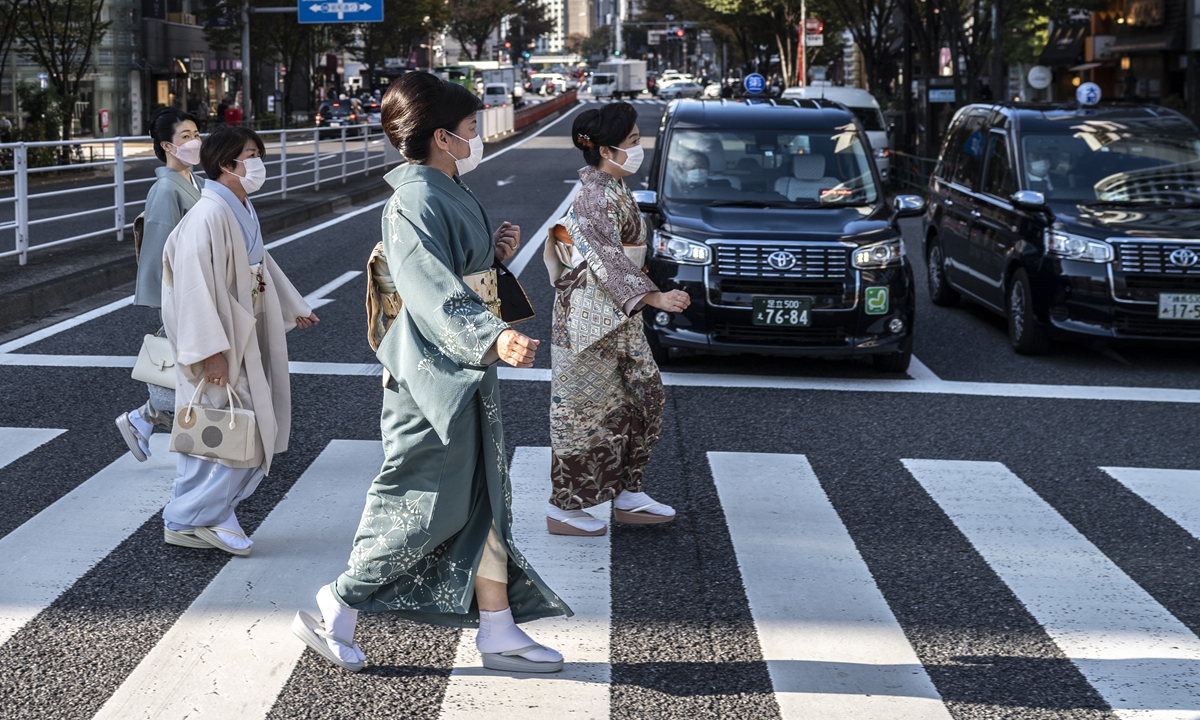
Women wearing traditional kimonos cross a street in Tokyo's Ginza area, Japan. Photo: AFP
Although the two biggest economies in Asia have disputes over the Diaoyu Islands and other issues, Japanese officials said economic cooperation and business exchange between China and Japan need to be enhanced.
At the 7th Japan-China CEO and Former Senior Official's Dialogue, held via video link in Beijing and Tokyo on Tuesday, Japanese Prime Minister Fumio Kishida said in a pre-recorded speech that he hoped to establish a "constructive and stable relationship" with China.
Even if the coronavirus pandemic drags on, it cannot break off exchanges between China and Japan in the business sector, Kishida said.
"It's time for Japan and China to carry out in-depth exploration in how to coordinate [the efforts]," former Japanese prime minister Yasuo Fukuda said at the opening ceremony of the event via video.
"Now, the economic activities of Japan and the US cannot be separated from China, and China's economic prosperity can't be separated from Japan, the US and other Asian countries. So we need to prioritize coordination and cooperation," Fukuda said, also expressing his wish for a successful Beijing 2022 Olympic and Paralympic Winter Games.
Next year marks the 50th anniversary of the normalization of Japan-China diplomatic relations, and bilateral trade has surged from less than $2 billion to over $300 billion.
"The highly complementary economies of China and Japan mean their interests are intertwined with each other. They have huge potential in these cooperation areas: trade and investment, advanced manufacturing, digital economy, green economy, medical care, and third-party markets," Zeng Peiyan, former Chinese vice-premier and chairman of the China Center for International Economic Exchanges, said at the event. Zeng suggested that the two countries should try to amplify their cooperation.
China urged Japan to respect China's territorial sovereignty, maritime rights and interests, and avoid actions that could complicate the Diaoyu Islands issue and other issues. The Chinese side made the remarks during the 13th round of high-level consultations on maritime affairs held between China and Japan via video link on Monday, which was the first of its kind after Fumio Kishida took office in October.
China and Japan have established close ties in their industry chains over a long time, and their long-term stable cooperation will not be significantly affected by the short-term impact of changes in the global political landscape, Bao Jianyun, director of the Center for International Political Economy Studies at Renmin University of China, told the Global Times on Tuesday. Bao said that bilateral cooperation in the long run will be the mainstream direction for China-Japan relations.
Bao noted that some extreme political forces in Japan should realize that their inappropriate actions and refusal to cooperate with China will hurt Japan's interests and the country's future development.
China is capable of providing a broad market for Japanese products and industries, with a market potential larger than the US, he noted.
Bilateral cooperation in trade may be boosted when the world's largest free trade deal takes effect.
Starting from 2022, the Regional Comprehensive Economic Partnership (RCEP) will come into force. It is the first trade pact of its kind involving China, Japan and South Korea, while the three countries are also struggling to negotiate a trilateral free-trade agreement.
The RCEP trade deal will lift Japan's GDP by 2.7 percent and create 570,000 jobs, according to the Japanese government's estimate.




